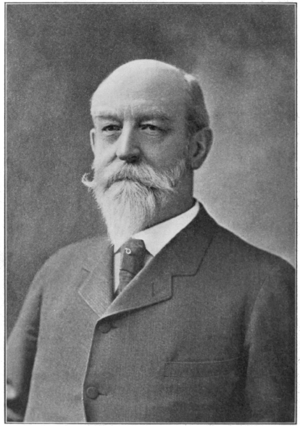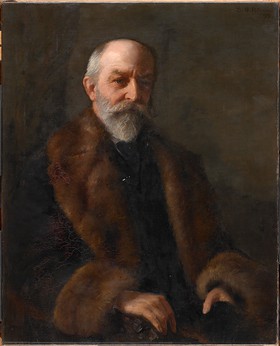Henry Pickering Bowditch facts for kids
Quick facts for kids
Henry Pickering Bowditch
|
|
|---|---|

Dean of Harvard Medical School
|
|
| Born | April 4, 1840 |
| Died | March 13, 1911 (aged 70) Jamaica Plain, Massachusetts
|
| Citizenship | U.S.A. |
| Education | Lawrence Scientific School |
| Alma mater | Harvard University |
| Known for | All-or-none law Kymograph |
| Spouse(s) | Selma Knuth |
| Scientific career | |
| Fields | Physiology |
| Institutions | Harvard Medical School |
| Notable students | Walter B. Cannon Charles Sedgwick Minot G. Stanley Hall |
| Influences | Claude Bernard Louis-Antoine Ranvier Carl Ludwig |
| Signature | |
Henry Pickering Bowditch (born April 4, 1840 – died March 13, 1911) was an important American scientist. He was a soldier, a doctor, and a physiologist. A physiologist studies how living things work. He also became the dean (head) of the Harvard Medical School.
Henry Bowditch followed his teacher, Carl Ludwig. He believed doctors should learn through scientific research. He taught at Harvard for 35 years.
Growing Up and Education
Henry P. Bowditch was born in Boston, Massachusetts. His family was well-known. His grandfather, Nathaniel Bowditch, was a famous mathematician. His brother, Charles Pickering Bowditch, became an archaeologist.
In 1861, Henry graduated from Harvard College. He then started studying at Harvard’s Lawrence Scientific School. His studies were paused when he joined the Union Army. He fought in the American Civil War. He became a major in the Fifth Massachusetts Colored Cavalry Regiment.
After the war, Henry finished his medical studies. He graduated from Harvard Medical School in 1868. Then, he traveled to Paris to study with Claude Bernard. Bernard was a very important scientist. In Bernard’s lab, Henry worked with other future scientists. These included Louis-Antoine Ranvier and Étienne-Jules Marey.
Henry continued his studies in Europe. He went to Bonn to work with Wilhelm Kuhne and Max Schultze. Finally, he went to Leipzig to study with Carl Ludwig. Ludwig had a special research program. Henry wanted to create a similar program at Harvard. Henry even improved a scientific tool called the kymograph while in Leipzig.
Career and Contributions
In 1871, Henry Bowditch became an assistant professor of physiology at Harvard. While still in Germany, he bought equipment for his new lab. He wanted to start a research training program. Just before sailing back to Boston, he married Selma Knuth.
The Bowditch laboratory at Harvard was the first physiology lab in the United States. It started in small rooms in the attic.
In 1876, Bowditch became a full professor. He worked alongside William James, who started a program for experimental psychology. Both Bowditch and James supported the "New Education" idea. This idea was promoted by Harvard's President, Charles William Eliot.
In 1887, Henry Bowditch helped start the American Physiological Society. He was also its first president. He served as the dean of the Harvard Medical School from 1883 to 1893. In 1903, he received a special honor called the George Higginson chair. He was also elected to the American Philosophical Society in 1904.
Henry Bowditch taught at Harvard for 35 years. He retired in 1906. He passed away in Jamaica Plain, Massachusetts, in 1911. Some of his famous students included Walter Bradford Cannon and G. Stanley Hall.
Henry's son, Manfred Bowditch, described his father as very inventive. Henry had a well-equipped workshop at a camp in the Adirondacks. He used his skills there, just like he did in his physiology lab.
Henry Bowditch received honorary degrees from five universities. These included Cambridge, Edinburgh, and Harvard. Since 1956, the American Physiological Society has given an award lecture in his honor. It is called the "Henry Pickering Bowditch Award Lecture."
Scientific Research
Henry Pickering Bowditch was known for his work on the heart and muscle contraction. He studied how the heart beats and how muscles move. He also researched the knee jerk reflex.
He became interested in anthropometry. This is the study of human body measurements. He showed that good nutrition and the environment help people grow and develop.
Bowditch's work connects important ideas in science. His teacher, Claude Bernard, talked about the "milieu interieur" (internal environment). Bowditch's student, Walter Cannon, later developed the idea of homeostasis. This is how the body keeps its internal conditions stable.


